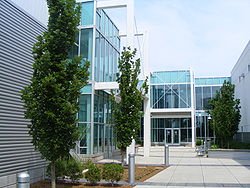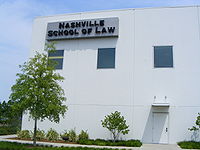- Nashville School of Law
-
The Nashville School of Law, (formerly known as the "Nashville Y.M.C.A. Night Law School"), is a private, night law school specializing in legal education for non-traditional, part-time, working professionals and others seeking a legal education. The student body has included business owners, doctors, dentists, business sales professionals, real estate agents, insurance agents, teachers, police officers, paralegals, and other professionals. The school's faculty members are some prominent practicing lawyers and judges from across the state of Tennessee; including retired Justice Adolpho Birch, and current Justice William C. Koch, Jr. of the Tennessee Supreme Court.
The school is located in a 33,000-square-foot (3,100 m2) building at 4013 Armory Oaks Drive, just south of downtown Nashville, Tennessee. Classes are held each evening Monday to Thursday. Students admitted for the Fall term typically attend on Monday and Thursday nights, while students admitted for the Spring term attend on Tuesday and Wednesday nights. Students must attend at least two sessions each week in order to complete the course of study in four years. All students must complete 48 credit hours with a GPA of at least 2.25 to graduate. The top ten percent of each graduating class is inducted into Cooper's Inn, the school honor society, and recognized at graduation. The student who graduates at the top of the class is awarded the Founder's Award and receives a set of the Tennessee Code Annotated.
Contents
Faculty
They have degrees from Vanderbilt, Harvard, Inter-American University of Puerto Rico, Emory, Tennessee, Howard, Memphis, North Carolina, St. Mary's, Duke, Samford, Tulane, Georgetown, as well as the NSL. Faculty members have extensive legal experience in private practice and public service. A number of faculty members have achieved national and international prominence in such areas as litigation, entertainment law, evidence, real estate, mediation and arbitration, criminal law, social security law, medical malpractice, products liability, employment and labor law, contracts, taxation, immigration and environmental law.
Because Nashville is the center of the state's legal community and the seat of state and local governments, many members of the faculty are judges from various courts, including the Tennessee Supreme Court and Court of Appeals, federal district court, and county courts.
History
In the fall of 1911, Morton B. Adams, William P. Cooper, Lee Douglas, and Robert Selph Henry, then recent graduates of Vanderbilt University Law School, opened night law classes at the Y.M.C.A. for the benefit of those unable to attend law classes during the day. The law school has been in continual operation since that time. It was incorporated under the laws of the State of Tennessee on January 19, 1927. Since that date, the law school has conferred the Juris Doctor or Doctor of Jurisprudence degree on over 2,970 graduates.
Until November, 1986, the school operated as the Nashville Y.M.C.A. Night Law School, leasing its classroom space from the Downtown Y.M.C.A. On November 24, 1986, the school officially changed its name to Nashville School of Law. In 1990 the school moved to 2934 Sidco Drive, and in Fall 2005 the school moved into its new state-of-the-art facility at 4013 Armory Oaks Drive.
The late James Gilbert Lackey, Jr. (1915–1987) served as Dean of the Law School and instructor in Contracts from 1946-1986. Upon his retirement, the faculty elected Honorable Joe C. Loser, Jr., Dean of the school. Judge Loser then retired from the Third Circuit Court of Davidson County, Tennessee after twenty years on the bench to become the fourth Dean in the school's history, accepting the duties and responsibilities of such office on August 23, 1986.
Several members of the Tennessee judiciary received their legal training at the school. Notable examples who also serve at the school include Judge Loser, the current Dean; Judge Steve R. Dozier, who recently presided over the nationally televised Perry March murder trial;[1][2] and Judge Frank G. Clement, Jr., a member of Nashville School of Law's Board of Trustees who also serves on the Tennessee Court of Appeals.[3]
Admissions
Nashville School of Law enters two terms each year, in February and August, and operates on a "rolling admissions" basis, which means applications are processed at the time they are received. Applicants must have received, or will receive prior to matriculation, a Bachelor's Degree from a college or university on the approved list of the Southern Association of Schools and Colleges, or the equivalent regional accrediting association.
The admissions process includes an admissions index computed as follows: Multiply the applicant's cumulative GPA—as determined by LSDAS[4]--by ten, then add 80% of the applicant's LSAT score. Applicants with an index score below 140 are not accepted. The applicant must also submit three letters of recommendation, one of which must be from someone in the legal field, and should describe any extracurricular activities during their undergraduate career or business accomplishments since college graduation. Applicants must also include an explanation of any prior arrests and/or any disciplinary action received from an educational institution. Nashville School of Law maintains a strict anti-discrimination and anti-harassment policy, and provides assistance for disabled students.
In 2006-2007, NSL received 430 applicants. For the Fall 2006 term, 90 were enrolled for their first year class, the Median LSAT was 152, the Median GPA was 3.28, 5% of the applicants were minorities, 48% of the applicants were women, and 40 undergraduate schools were represented. For the Spring 2007 term, 86 were enrolled in the first year class, the Median LSAT was 148, the Median GPA was 3.15, 13% of the applicants were minorities, 45% were women, and 42 undergraduate schools were represented. The total enrollment for the year was 640 students.[5] The average bar passage rate for NSL students graduating between 1996 and 2006 is 90%.[6]
Tuition and financial aid
Nashville School of Law's tuition is among the lowest of private law schools in the United States. For the 2009-10 school year the tuition is $424.00 per credit hour. For the first year student taking the required 12 hours, this amounts to $5,088.00. Students may pay their tuition in full at registration for a 5% discount, or in monthly installments with no interest or additional charges. Also included in annual expenses is a $60.00 registration fee, a $60.00 Westlaw fee, and a $60.00 Lexis Nexis fee, and all other books and materials. As a private institution, NSL students are not eligible for government loans, although low interest loans are often available through banks, as well as a limited number of partial and full scholarships for second, third, and fourth year students, based on need and scholarship. Students seeking VA assistance must be enrolled 18 clock hours per week to be considered full time. No on-campus living facilities are available.
Academics
The law school provides a broad curriculum that challenges and develops students' analytical, communication and lawyering skills. The 48 credit hours required for the J.D. degree requires four years to complete, and several of the courses are designed to focus on practice in Tennessee. First Year students are required to take classes in Contracts and Sales, Introduction to Law and Legal Writing, Torts, Crimes, Constitutional Criminal Law, and Criminal Procedure. Second Year students are required to take Evidence, Civil Procedure, Restitution and Remedies, and Property. Third and Fourth Year students take Ethics and Professionalism, Wills, Estate Planning, Business Associations, Advanced Legal Writing, Third and Fourth Year Moot Court, Negotiable Instruments, Secured Transactions, Constitutional Law, Conflicts of Law, Mortgages, and Domestic Relations. For 2008-2009 entering first year students, seven elective credits, which vary from year to year, must be earned to complete the degree requirements.
The Nashville School of Law Library consists of 15,727 hard copy volumes. All students have access to LexisNexis and Westlaw research services in the library at the computer lab, from any location in the facility through a wireless-enabled laptop, and from any other location with Internet access.
Nashville School of Law also sponsors mock trial tournament teams which participate in national moot court trial competitions. Students can also participate in the NSL Student Chapter of the American Association for Justice (formerly known as the Association of Trial Lawyers of America), which meets on a regular basis.
Accreditation
Nashville School of Law is approved by the Tennessee Board of Law Examiners and graduates may take the bar examination and practice law in the State of Tennessee; in order to continue to fulfill its mission of providing an accredited high quality legal education, Nashville School of Law maintains its value with affordable tuition. The School is not, however, accredited by the American Bar Association. This limits the ability of graduates to practice law in states other than Tennessee, upon seeking admittance to practice in another state the graduate will need to file appropriate waivers with the respective Supreme Court in the state they are seeking admittance.
Admissions Policy
In recent years the number of applicants for admission to the School has far exceeded the accommodations available, thus causing the School to limit its first year enrollment.
Applicants must have received, or will receive prior to matriculation, a Bachelor's Degree from a college or university on the approved list of the Southern Association of Schools and Colleges, or the equivalent regional accrediting association.
The undergraduate GPA will be considered along with the LSAT score. The admissions process includes an admissions index computed as follows by LSDAS: multiply the applicant's cumulative GPA, as determined by LSDAS, times ten plus 80% of the applicant's LSAT score. Applicants with an index score below 140 are not accepted.
Applicants must register with the LSDAS service, as well as take the LSAT. Each applicant should describe any extracurricular activities of the applicant during his/her undergraduate college career and any business accomplishments since college graduation.
The applicant must submit three letters of recommendation, one of which must be from someone in the legal field. The letters of recommendation may be sent to LSDAS or directly to the NSL Admissions Committee.
Notable alumni
- Albert Gore, Sr. (1907–1998), former U.S. Senator and father of former Vice President Albert Gore, Jr. [7]
- Jack Kershaw (1913–2010), attorney and sculptor who represented James Earl Ray.[8]
Notes
- ^ Metropolitan Government of Nashville and Davidson County. Steve R. Dozier's biography page
- ^ Court TV. Archive of Perry March murder trial
- ^ Tennessee Administrative Office of the Courts. Court of Appeals biography page
- ^ LSDAS is an acronym for the Law School Data Assembly Service, a division of the Law School Admissions Council. For more information, see About the LSDAS (LSAC). To submit a LSDAS report to Nashville School of Law, use school code 1974.
- ^ http://www.nashvilleschooloflaw.net/NSL%20Catalog%202006-2007%20Insert.pdf
- ^ Nashville School of Law - About the School
- ^ The Life of Albert Gore, Sr
- ^ Martin, Douglas. "Jack Kershaw Is Dead at 96; Challenged Conviction in King’s Death", The New York Times, September 24, 2010. Accessed September 25, 2010.
External links
- Nashville School of Law Homepage
- Nightlaw.com (an independent forum for Nashville School of Law students)
- Interview with Dean Loser in the Nashville City Paper
Categories:- Educational institutions established in 1911
- Universities and colleges in Nashville, Tennessee
- Universities and colleges accredited by the Southern Association of Colleges and Schools
- Law schools in Tennessee
- Universities and colleges founded by the YMCA
Wikimedia Foundation. 2010.


